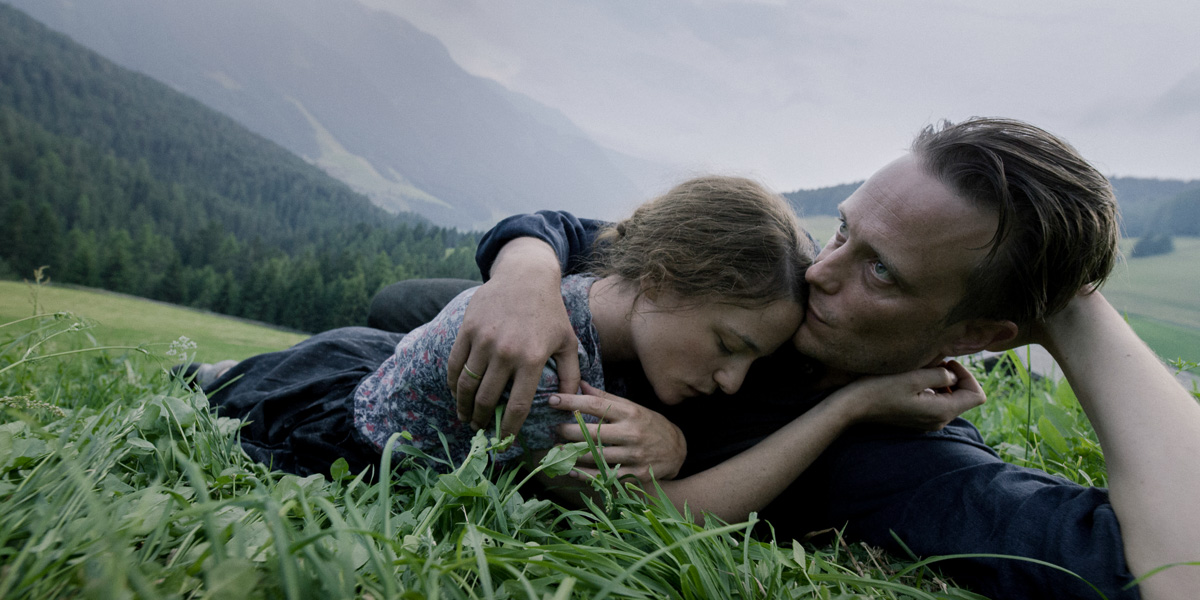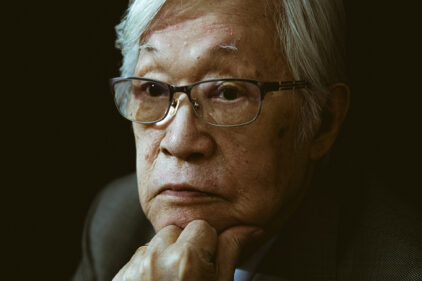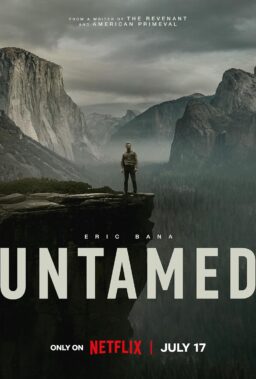Two films that premiered at Cannes have made the journey across the pond to Toronto, and they’re a pair of films by undeniable masters, although only one truly affirms that title for its auteur.
Terrence Malick’s has been searching for meaning and questioning faith in arguably all of his films, but especially in his recent works. “The Tree of Life” looks for meaning in history, “To the Wonder” in religion, “Knight of Cups” in excess and celebrity. He finds perhaps his most fascinating surrogate in a man who died before the end of World War II, and Malick turns that man into a Christ figure, someone whose unshakeable belief in right and wrong cost him his life. If God has abandoned us, like he did his son, and won’t explicitly show us the way, how do we know how to do what’s right? And when the world challenges our beliefs, how do we know when to give in and when to stand our moral ground?
Malick has made a film that’s designed to challenge the viewer – arguably just in running time alone at nearly three hours – but also feels like a more spiritually confident film than his recent works. It reminds of “Silence,” another work from a master about challenged faith and one that clearly reflects its filmmaker’s lifelong personal dissection of the importance of God in his life.
Somewhat surprisingly, “A Hidden Life” opens in wartime with news footage of Hitler being saluted by hundreds of Germans. This is important because it means that even the early scenes of peaceful life in the Austrian village of St. Radegund have a sense of impending dread, the knowledge of what’s going on in the rest of the world and how it will soon encroach on the happiness between Franz Jägerstätter (August Diehl) and his wife Franziska (Valerie Pachner). Beautifully shot by Jörg Widmer, who worked on “The Tree of Life,” “A Hidden Life” bears the visual hallmarks of modern Malick with an even greater emphasis on the natural world than ever before. This is a film about war, but the imagery that comes to mind after seeing it is mountains, grass, a waterfall. In many ways, Malick is questioning the disruption of the natural world caused by man’s cruelty.
Franz is a devout Christian and hard-working family man, but he starts to bristle at the Nazi ideology spreading through even his remote village. When it is announced that all Austrians will have to swear a loyalty oath to Hitler, he refuses. As the men in his village go off to fight for the Third Reich, his life is torn apart. The village turns on him – after all, why should the other men have to die to protect him? – and the first half of “A Hidden Life” is an exercise in dread. He knows the Nazis will come for him. It’s only a matter of when, and whether or not he will give in and deny his own beliefs to keep himself alive.
What can one man do when contrasted against something as evil as the Third Reich? Is there even any point in a conscientious objector? Malick ties Franz’s story directly to that of Christ in an excellent scene with a religious painter in which he speaks of how the villagers turned against God’s son. Would you have been someone who threw stones or objected? “A Hidden Life” asks challenging questions about what it means to be faithful and what it means to be human. It’s startling how much Franz never really loses his moral center, even providing bread to hungry fellow prisoners and sending encouraging letters to his wife.
This is a very long film, but I think that’s part of Malick’s point. It’s a story of perseverance, why not challenge the audience too? (Half of me thinks he wishes it could have been an hour longer for that reason). It is a beautiful, moving drama that I’m eager to see released because the conversation around it is going to produce some of the best writing on film this year. I’m eager to see it again and dive into it deeper in a longer form. For now, just know that it’s one of the most impressive films of 2019.

Sadly, another film about a man who was called traitor by those with whom he was once allies is more disappointing. TIFF scheduled the recent restoration of Marco Bellocchio’s 1965 breakthrough “Fists in the Pocket” as a companion to his latest work, set to be released five decades after that film, “The Traitor,” which world premiered earlier this year at Cannes and has already grossed over $5 million in Europe. While the film is loaded with interesting details and the confidence of a director who has been making films for longer than a lot of you have been alive, it’s ultimately a disappointment. “The Traitor” is really only for people with an excessive curiosity about the Italian mafia.
In a sense, it’s about the end of a major chapter in that world in the ‘80s, while also clearly being an attempt by Bellocchio to de-romanticize the mob. Tommaso Buscetta (played expertly by Pierfrancesco Favino) was “the boss of two worlds,” even though he didn’t really have a ton of power in either faction of the mafia. He was a loyal member of the Cosa Nostra when one of the factions when heroin divided the mafia in the early ‘80s, leading to bloodshed everywhere. Buscetta had to flee and watched as everyone he cared about was threatened or killed, finally deciding to testify against his former “family.”
“The Traitor” imbues Buscetta with so much humanity that’s clearly designed as an answer to the myth of the “rat” character in most mob movies. Surprisingly, the bulk of the film takes place in a courtroom, in which Buscetta literally has to confront his former allies. Favino is excellent in these scenes, which allow a crazy window into the Italian legal process, in which other mob members are in cells in the back of the room, often yelling insults at Buscetta. It’s more of a carnival than a courtroom, and it’s really interesting stuff. The rest? Not so much. I found most of “The Traitor” too dry by some stretch, and never cared about what happened to Buscetta as the piece got weighed down with characters and details. It’s probably all very accurate, just not very entertaining.












